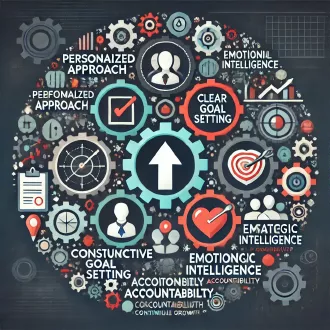Transcription The importance of a coach in your life
The world of coaching is comprised of a variety of approaches and models, each with its own purpose and methodology designed to meet the unique needs of those seeking to develop.
As we explore these models, it is important to understand that the point is not to draw comparisons of superiority, but to appreciate the differences and individual contributions of each approach to the overall coaching landscape.
Among the most in demand are:
- Life Coaching: this is a common and widely known perspective. In this model, the emphasis is on the needs of the individual. The life coach becomes an ally whose mission is to help the coachee achieve his or her personal goals. Unlike therapy, life coaching does not address deep psychological problems, but rather specific personal behavioral goals. This approach is aligned with the desires and needs of the coachee, whatever their goal, whether it is to write a book, get in shape or overcome an obstacle, for example.
- Executive Coaching: positions itself somewhere in the middle, focusing on the needs of executives. The executive coach seeks to improve the individual skills of the executive but with the idea that this will have an impact on the performance of the organization. For an executive coach, it is essential to understand the language and perspective of the executive, which requires solid experience in the business world. This approach seeks to improve the specific skills of leaders, with the ultimate goal of improving organizational performance.
- Business Coaching: In a broader scope, this model focuses on organizational performance and how the interactions between processes, culture and people impact the efficiency and effectiveness of the business. The business coach does not focus on a particular individual, but on the system as a whole. Improving organizational performance is the primary goal here, with the aim of achieving higher quality, productivity and customer satisfaction.
- Leadership Coaching: This approach focuses on the leader of a team, organization or group. As a coach, the focus is on improving the leader's abilities to positively impact his or her team and, consequently, the organization. Here, the focus is divided between quantitative measures of performance and behavioral and cultural aspects. The goal is to elevate both tangible results and human behavior in the team.
It is crucial to note that each model has its place and function in the coaching landscape. Solution, transformational, cognitive-behavioral, and developmental-focused models are just a few of the many approaches coaches can employ based on the specific needs of their coachees.
Each of these coaching models has its own techniques, methodologies and approaches, but all share the fundamental objective of helping coachees achieve their goals, overcome obstacles and maximize their potential. The choice of coaching model will depend on the individual needs and objectives of each person seeking coaching.
importance coach




